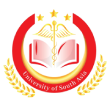Graduate Programs
The University of South Asia, a prominent institution known for its commitment to academic excellence, offers a diverse range of bachelor programs within the medical field. The university has been actively expanding its offerings to cater to the growing demand for qualified professionals in healthcare.
One of the flagship programs at the University of South Asia is the Bachelor of Medicine and Bachelor of Surgery (MBBS) program also known as Medical Doctor / General Medicine (MD). This comprehensive and rigorous program equips students with the necessary knowledge and practical skills to embark on a career in medicine. The curriculum covers a broad spectrum of medical sciences, including anatomy, physiology, pharmacology, pathology, and clinical medicine.
In addition to the MBBS program, the university provides various other bachelor programs in the medical domain, creating opportunities for students to specialize in specific areas of healthcare. Some of these programs may include Bachelor of Dental Surgery (BDS), Bachelor of Nursing (BScN), Bachelor of Pharmacy (BPharm), and Bachelor of Medical Laboratory Sciences (BMLS). These specialized programs allow students to pursue their interests and contribute to various facets of the healthcare industry.
The availability of bachelor programs at the University of South Asia reflects its dedication to meeting the evolving needs of the healthcare sector. The university often collaborates with leading medical professionals and institutions to ensure that its programs align with industry standards and advancements in medical research and practice.
The admission process for these programs typically involves a rigorous selection criteria to ensure that students admitted possess the aptitude and commitment required for a career in healthcare. Prospective students may need to undergo entrance examinations, interviews, and academic evaluations as part of the admission process.
The University of South Asia’s commitment to providing quality education in the medical field is further underscored by its state-of-the-art facilities. Modern laboratories, well-equipped classrooms, and collaborations with top-tier healthcare facilities for practical training contribute to the holistic development of students.
Moreover, the university’s faculty, comprised of experienced educators and professionals in the medical field, plays a crucial role in nurturing the next generation of healthcare professionals. Their expertise, coupled with a student-centric approach, ensures that students receive a well-rounded education that prepares them for the challenges and opportunities in the healthcare sector.
As the demand for skilled healthcare professionals continues to rise globally, the University of South Asia’s focus on expanding and enhancing its bachelor programs in the medical field positions it as a key player in contributing to the workforce in this critical sector. Graduates from the university are well-equipped to make meaningful contributions to healthcare delivery, medical research, and community health initiatives.
In conclusion, the University of South Asia’s medical programs, including the flagship MBBS program and specialized bachelor programs, demonstrate its commitment to providing quality education in the field of healthcare. The availability of these programs reflects the university’s responsiveness to the dynamic healthcare landscape, ensuring that graduates are well-prepared for fulfilling and impactful careers in the medical field.
